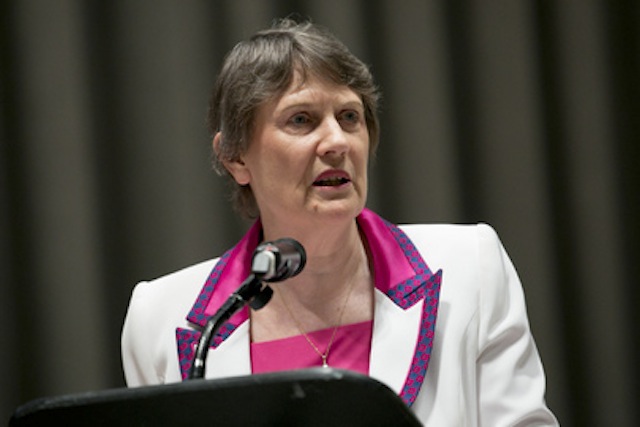UNDP Plans Lay-Offs, Salary Cuts and Demotions

UNITED NATIONS, May 30 (IPS) - The United Nations Development Programme (UNDP), one of the largest U.N. agencies with an estimated average annual budget of more than five billion dollars, is undergoing major structural changes - triggering large-scale staff layoffs, demotions, salary reductions and downgrading and abolition of existing senior-level jobs.
"If implemented as envisaged, it will be one of the largest mass-scale U.N. firings in living memory," a senior U.N. staffer told IPS.
"We never had it so bad because all those staffers who lose their jobs and their G-4 visas will have to go back to their home countries," he added.
Barbara Tavora-Jainchill, president of the U.N. Staff Union, told IPS her union, which oversees the interests of staffers in the U.N. secretariat and field operations, is concerned about the "structural review" currently being undertaken by the UNDP administration.
"We understand, this may cause demotions as well as the loss of at least 30 percent of jobs in their New York Headquarters and, we just heard, several security-related posts in the field, as well," she said.
"We are still learning details about this exercise and wonder whether there is any legal basis for the UNDP administration's actions."
She said her own staff union will "fully support our UNDP counterparts and will help them in any way we can."
In anticipation of strong negative reactions, UNDP Administrator Helen Clark said in a letter to staffers last week: "Our services will be much more focused in the regions and we will be leaner."
"We will have significantly fewer D grade (director level) positions relative to other professional and general services grades."
This means that many people's jobs are affected, "and we will be embarking on a realignment process aimed at being as fair and transparent as possible to fill the new positions."
She also said: "I understand, however, that some staff may wish to take the opportunity to leave UNDP, rather than compete for new positions."
"To facilitate this, we will be making available a limited number of voluntary separation packages," said Clark, a former prime minister of New Zealand and head of the U.N. Development Group.
Currently, the U.N. Secretariat has a staff of over 6,700, mostly in New York, and the UNDP's total staff is estimated at over 3,000, including field operations.
3The New York-based UNDP also has offices in 170 countries and territories and is the lead U.N. body overseas, headed by a Resident Representative (ResRep) in each country.
Playing a crucial role in social and economic development, one of the key mandates of the United Nations, the UNDP focuses on four main areas: poverty reduction and achievement of the Millennium Development Goals (MDGs); democratic governance; crisis prevention and recovery; and environment and energy for sustainable development.
In all its activities, UNDP says it encourages the protection of human rights and the empowerment of women, minorities and the poorest and most vulnerable.
At its headquarters in New York, the UNDP has bureaus for development policy; crisis prevention and recovery; management; and external relations and advocacy.
It also has regional bureaus overseeing Africa, Arab States, Asia and the Pacific, Europe and Commonwealth of Independent States (CIS) and Latin America and the Caribbean.
UNDP's regular resources come entirely from voluntary contributions by a range of partners, including member states, and multilateral and other organisations.
These contributions, UNDP says, are provided as either regular budget resources or as other resources earmarked by contributors.
A total of 50 countries contributed to regular resources in 2012, which totalled 846.1 million dollars.
The figure for "other resources" was about 3.79 billion dollars in 2012.
And local resources provided by programme countries increased by 5.3 percent in 2012 over 2011, while multilateral contributions rose to over 1.5 billion dollars.
Clark said the structural change was the brainchild of the UNDP executive board, comprising 36 member states, represented on a regional basis.
Last year, the board approved "a new Strategic Plan for UNDP", and since then the whole organisation has been making the changes necessary to fully implement that plan.
One of the three pillars of that plan was improving institutional effectiveness.
To that end, Clark told staffers, the organisation has conducted significant reviews of its performance and "we have all been involved in planning and implementing changes."
At the country office level, there has been a "financial sustainability exercise" which has led to many changes.
Also, over recent months, there has been an ongoing structural change exercise at the headquarters and regional levels to achieve a number of efficiency gains, she pointed out.
"We committed to moving more of our policy and support services to the regional level so that we are closer to our country offices."
This, she said, includes removing unnecessary duplication between bureaus; ensuring functions are properly aligned through the organisation to improve accountability and professional standards; and improving "our span of control so that we have better career paths for younger staff."
She said plans "to reduce our spending on staff salaries were meant to stay within the integrated budget limits set by the executive board in September."
In conclusion, Clark said: "Let me say to you all that I recognise that this is not an easy time for staff."
"I also know that we can be a stronger, more effective development organisation which can make real differences in millions of people's lives."
By demonstrating that to the world, "I have no doubt that there are many exciting opportunities out there for UNDP to build on."
(END)
© Inter Press Service (2014) — All Rights Reserved. Original source: Inter Press Service
 Global Issues
Global Issues